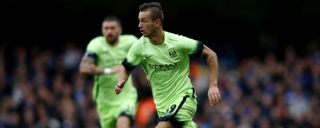|
Manchester City have spent a lot of money. It is both a refrain of Jose Mourinho's and the truth. Yet it is also true that a club with the fifth-highest turnover in world football are beginning to bring in a lot. City have reported profits in each of the last four financial years, with a surplus of £10.4 million in the 2017-18 season. That owes something to a profitable ploy: selling players they were unlikely to pick. It sounds obvious, but few have made as much money from superfluous figures as City in recent years. It is an illustration of how a supposed billionaire's plaything has become a business. The significant numbers at the Etihad Stadium do not just concern the goals, points and wins accrued in a record-breaking season. In this year's annual report, chairman Khaldoon Al Mubarak wrote of "our strategy for on-field success with a commercially and financially sustainable organisation." Sales help with the sustainability. This summer around 60 percent of Riyad Mahrez's club-record purchase was funded by disposing of fringe figures: they raised about £36m from Angus Gunn, Jason Denayer, Bersant Celina, Olarenwaju Kayode, Pablo Maffeo and Angelino. Together, they made a grand total of seven City appearances, with only a 13-minute cameo from Celina in the Premier League. Had Oleksandr Zinchenko, signed for £1.5m and valued at £16 million when Fulham and Wolves were interested, also gone, City's net spend for the window would have been just £8m. It was altogether larger last year, but City still brought in around £90m which, to put it another way, financed the arrivals of Kyle Walker and Ederson. If the £25m departure Kelechi Iheanacho scored some important goals, Enes Unal, Aaron Mooy, Olivier Ntcham and Ruben Sobrino never made a senior City appearance. Bruno Zuculini made one. Each brought in more money than the senior players released in the last two summers: Yaya Toure, Pablo Zabaleta, Jesus Navas, Gael Clichy, Bacary Sagna and Willy Caballero. The unknowns and the understudies have proved a cash cow. "I just think it is good business," said City's football administration officer Brian Marwood. "We are developing our assets and we are prepared to put a lot of resources so that player becomes a Man City player or he can have a very good career at a very good level." That level may not be City's. "Realistically, would you have a team full of academy graduates? I don't think you can in today's game," Marwood said. "But there is no reason why we can't continue to develop players of the stature of Phil Foden." The midfielder may yet become a regular at the Etihad Stadium, though Jadon Sancho decamped to Borussia Dortmund and debuted for England sooner. He avoided the fate of the Chelsea products whose development stalled. If comparisons are obvious, City are understandably touchy about them. The Londoners may have a profitable football factory, but their academy products rarely progress to the first team. Potential is identified at other clubs but often goes unfulfilled. Yet there are common denominators among the nouveau riche, of young talents picked up, polished up, loaned out and sometimes sold. City's argument is that their investment stretches far beyond the purchase price and salary. "It would be quite mind-boggling if I gave you the sums in terms of what development costs," Marwood added. "People have to understand there is a huge cost regarding this operation, to create and develop in football from an early age. Clearly, in any business if you have that cost you want to get a return on that. "We are not the only ones who are doing it. There are other clubs and I am sure they start with the same premise as us of, 'Can they play in Man City's first team?' Can we develop them to become a Man City, or Chelsea or Liverpool player? But if you can't, then how do you create a better-value player?" The difference with Liverpool, however, is that whereas they receive the occasional windfall for a key player, whether Philippe Coutinho, Raheem Sterling or Luis Suarez, City have sold only Iheanacho and Alvaro Negredo for £20m or more in the Sheikh Mansour era. Others have left for less eye-catching fees. But collectively, they are starting to add up. It is a model that the elite clubs, with their pulling power, facilities, relationships and, in City's case, global network of sister outfits, are best placed to deploy. Marwood argued everyone benefits. "We create pathways for them and that is why loaning them to our partner club NAC Breda, loaning them to Girona, with the relationship we have with Celtic, we want to help grow our players." There was a time when Maffeo and Angelino may have been the successors to the four ageing full-backs Pep Guardiola inherited; instead, their fate was finalised by the £100m pair of Walker and Benjamin Mendy. City recouped £14m. "We take them on this journey and at some point they stay with you or they leave," said the former Arsenal winger Marwood. "And while they have gone for good money, they have gone to really good clubs. Angelino went to PSV Eindhoven. Pablo Maffeo went to Stuttgart." Perhaps it points to the future for Patrick Roberts, Tosin Adarabioyo, Marlos Moreno, Aleix and Manu Garcia, all loaned out now and potential departures who may fund a signing in a summer to come. It is the art of the footballing deal, finding a way to bolster the team without weakening the first-team squad. City have begun to excel at it. And as Marwood said: "If you want to call it a business, it is a good business."
|

